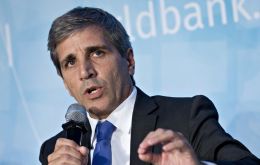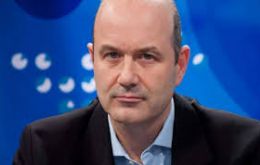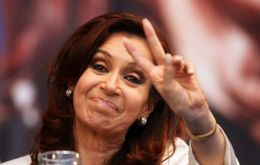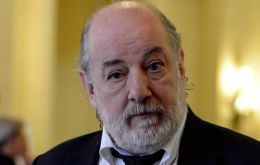MercoPress. South Atlantic News Agency
Tag: Argentine Central Bank
-
Tuesday, August 14th 2018 - 06:50 UTC
Argentina pledges US$ 500 million on Tuesday to stabilize the forex market

Argentina's peso hit an all-time low on Monday as Latin American currencies sank amid a broader sell-off in emerging markets that have been rattled by the Turkish lira's plunge.
-
Monday, July 23rd 2018 - 07:15 UTC
Top grades for Macri and his reform policies from IMF's Lagarde

Christine Lagarde, Managing Director of the International Monetary Fund, met with Argentina’s President Mauricio Macri, Finance Minister Nicolas Dujovne and Central Bank Governor Luis Caputo in the context of the Group of 20 Finance Ministers and Central Bank Governors meeting in Buenos Aires over the weekend.
-
Tuesday, July 3rd 2018 - 07:33 UTC
Argentina hikes bank reserves; Peso gains 1.9% vs the dollar and settles at 28.3

Argentina's central bank said on Monday that it hiked bank reserve requirements by 3 percentage points, following a hike of three percentage points on June 18 as monetary policymakers seek to calm inflation and end a run on the peso currency. The Peso gained 1.9% on Monday against the dollar.
-
Tuesday, May 15th 2018 - 06:54 UTC
Argentina's “L” Day challenge: US$ 25bn in Peso bonds mature on Tuesday

The Argentine Peso plummeted to a new low on Monday despite government attempts to curb losses in recent weeks by hiking interest rates and shedding billions in foreign reserves. The Peso fell sharply on opening Monday and closed down 6.2%, trading at 25.52 against the dollar, having lost close to 33% so far this year.
-
Tuesday, April 24th 2018 - 07:22 UTC
IMF forecasts Argentina will grow 2% this year because of the drought and fiscal shortcomings

The International Monetary Fund’s (IMF) World Economic Outlook update for April 2018 has reduced its expectations of growth for Argentina this year, and its projected annual inflation rate largely exceeds the 15% goal set by president Mauricio the Macri administration in December 2017.
-
Thursday, March 8th 2018 - 09:35 UTC
Argentine central bank anticipates volatility in the money exchange market

Argentines will have to get used to the volatility of the money exchange rate, advised Central Bank president Federico Sturzenegger on Wednesday when the US dollar (a sacred reference for Argentines) reached a new historic high above the 20 Pesos. (Actually 20,69 for retail sales and 20,69 for wholesale operations at the end of trading).
-
Thursday, August 10th 2017 - 09:43 UTC
Fear of a Cristina Fernandez comeback has cost the Argentine central bank over a billion dollars

The Argentine primary next Sunday when the different parties will choose their candidates for the midterm elections of 22 October, and the possibility of a comeback of ex president Cristina Fernandez, and all that she represents, has cost the Argentine central bank so far over a billion dollars in the last ten days.
-
Thursday, November 17th 2016 - 09:10 UTC
Argentina's central bank cuts benchmark rate despite Peso's depreciation

Argentina's central bank cut its benchmark interest rate for the second time in two weeks in a surprise move amid market expectations it would hold steady after a high inflation reading and U.S. elections last week.
-
Monday, October 24th 2016 - 17:43 UTC
Billions pour in to buy Argentine bonds, “sign of growing investor confidence”

Argentina’s international currency reserves rose above the landmark US$40 billion for the first time in three and a half years last Friday, as a huge inflow of dollars from government-issued debt and some exports over the last few days caused some dramatic increases this week. The milestone, according to Central Bank chief Federico Sturzenegger, was “a sign of growing investor confidence in the country.”
-
Saturday, May 14th 2016 - 08:02 UTC
Cristina Fernandez and former officials charged with defrauding the state in dollar futures operations

Former Argentine President Cristina Fernandez was charged on Friday with defrauding the state as part of her government's handling of the dollar futures market. Federal judge Claudio Bonadio said that a scheme to keep the Argentine peso inflated by selling dollars below market value would not have been possible without Fernandez's approval.
